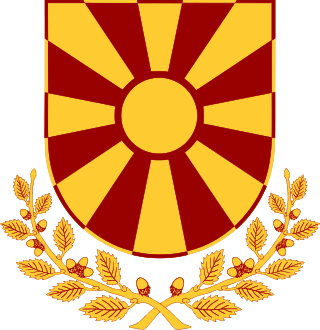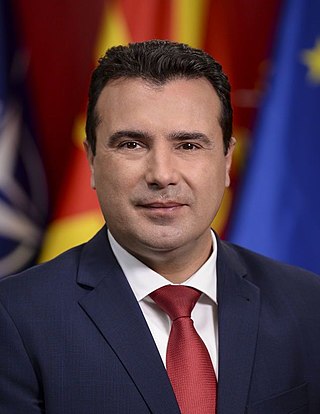| |||||
| Decades: | |||||
|---|---|---|---|---|---|
| See also: | Other events of 2017 History of North Macedonia • Years | ||||
Events from the year 2017 in the Republic of Macedonia .
| |||||
| Decades: | |||||
|---|---|---|---|---|---|
| See also: | Other events of 2017 History of North Macedonia • Years | ||||
Events from the year 2017 in the Republic of Macedonia .

The Social Democratic Union of Macedonia is a social-democratic political party, and the main centre-left party in North Macedonia. The party is pro-European.

Robert John Blackman MP is a British politician who has been the chairman of the 1922 Committee and chair of the Backbench Business Committee since 2024. A member of the Conservative Party, he has been the Member of Parliament (MP) for Harrow East since 2010. He served as the Joint Executive Secretary of the backbench 1922 Committee from 2012 to 2024. Blackman was the Member of the London Assembly (MLA) for Brent and Harrow between 2004 and 2008.

The president of the Republic of North Macedonia is the head of state of North Macedonia.

Nikola Gruevski is a former Macedonian politician who served as Prime Minister of Macedonia from 2006 until his resignation, which was caused by the 2016 Macedonian protests, and led the VMRO-DPMNE party from 2004 to 2017. He is the longest serving post-independence Macedonian prime minister, serving more than nine years in office.

Klubi i Futbollit Shkëndija, commonly known as Shkëndija, is a professional football club based in Tetovo, North Macedonia. Their home stadium is Ecolog Arena and they currently play in the Macedonian First League. In the 2010–11 season of the Macedonian First Football League, the club won its first major championship.

Alexis Tsipras is a Greek politician who served as Prime Minister of Greece from 2015 to 2019.

Gjorge Ivanov is a Macedonian politician, who served as the 4th President of North Macedonia from 2009 to 2019.

North Macedonia is a member state of the North Atlantic Treaty Organization (NATO). In 1995, the country joined the Partnership for Peace. It then began taking part in various NATO missions, including the International Security Assistance Force and the Resolute Support Mission in Afghanistan. At the 2008 Bucharest summit, Greece vetoed the country's invitation to join; however, NATO member states agreed that the country would receive an invitation upon resolution of the Macedonia naming dispute. Following an agreement in June 2018 to rename the country, representatives of NATO member states signed a protocol on the accession of North Macedonia to NATO on 6 February 2019. Over the next thirteen months, all of NATO's 29 member states ratified the protocol. The accession protocol entered into force on 19 March 2020, allowing North Macedonia to deposit its instrument of accession and thereby become NATO's 30th member state on 27 March 2020.

North Macedonia, officially the Republic of North Macedonia, is a landlocked country in Southeast Europe. It shares land borders with Greece to the south, Albania to the west, Bulgaria to the east, Kosovo to the northwest and Serbia to the north. It constitutes approximately the northern third of the larger geographical region of Macedonia. Skopje, the capital and largest city, is home to a quarter of the country's population of 1.83 million. The majority of the residents are ethnic Macedonians, a South Slavic people. Albanians form a significant minority at around 25%, followed by Turks, Roma, Serbs, Bosniaks, Aromanians and a few other minorities.

Zoran Zaev is a Macedonian economist and politician who served as prime minister of North Macedonia from May 2017 to January 2020, and again from August 2020 to January 2022.

General elections[a] were held in the Republic of Macedonia in April 2014 to elect the President and members of parliament. The first round of the presidential elections were held on 13 April, with incumbent president Gjorge Ivanov finishing first with 53% of the vote. However, as he did not receive the support of 50% of all registered voters, a second round was held on 27 April, alongside parliamentary elections, with Ivanov and the ruling coalition led by VMRO-DPMNE claiming victory as Ivanov was elected president and the VMRO-DPMNE won 61 of the 123 seats in the Assembly.

This national electoral calendar for 2016 lists the national/federal elections held in 2016 in all sovereign states and their dependent territories. By-elections are excluded, though national referendums are included.
In May 2015, protests occurred in Skopje, Republic of Macedonia, against the incumbent Prime Minister Nikola Gruevski and his government. Protests began following charges being brought up against Zoran Zaev, the Social Democratic opposition leader, who responded by alleging that Gruevski had 20,000 Macedonian officials and other figures wiretapped, and covered up the murder of a young man by a police officer in 2011. A protest with up to 2,000 attendees occurred on May 5, seeing clashes between activists and police.

Early parliamentary elections were held in Macedonia on 11 December 2016, having originally been planned for 24 April and later 5 June.

In April 2016, protests began in the Republic of Macedonia against the incumbent President Gjorge Ivanov and the government led by the interim Prime Minister Emil Dimitriev from the ruling VMRO-DPMNE party. Referred to by some as the Colorful Revolution, the protests started after the controversial decision by President Gjorge Ivanov to stop the investigation of former Prime Minister Nikola Gruevski and dozens of politicians who were allegedly involved in a wiretapping scandal. The demonstrations were organized by "Protestiram" and supported by a coalition led by the Social Democratic Union of Macedonia and other opposition parties, in addition to the newly formed Levica demanding that the government resign and be replaced by a transitional government and that the parliamentary elections planned for 5 June 2016 be cancelled, on the grounds that the conditions for free and transparent elections were not in place. The government and its supporters, who had organized pro-government rallies, maintained that the elections on June 5 were the only solution to the political crisis, with some observers blaming the opposition for creating a "Ukraine scenario" in Macedonia.
The following lists events from the year 2016 in the Republic of Macedonia.

India–North Macedonia relations are the bilateral relations between India and North Macedonia.
Storming of the Macedonian Parliament, also known as Bloody Thursday occurred on 27 April 2017, when about 200 Macedonian nationalists stormed the Macedonian Parliament in reaction to the election of Talat Xhaferi, an ethnic Albanian, as Speaker of the Assembly of the Republic of Macedonia. It was the biggest attack in history on a Macedonian institution.

Early parliamentary elections were held in North Macedonia on 15 July 2020. It was originally scheduled for November 2020, but Prime Minister Zoran Zaev called early elections after the European Council failed to come to an agreement on starting talks with North Macedonia on joining the European Union in October 2019. The election date was set for 12 April, but was postponed until July due to the COVID-19 pandemic in North Macedonia.
The Party of Pensioners is a political party in North Macedonia. In the 2020 elections, the party won one seat as part of the SDSM-led coalition.